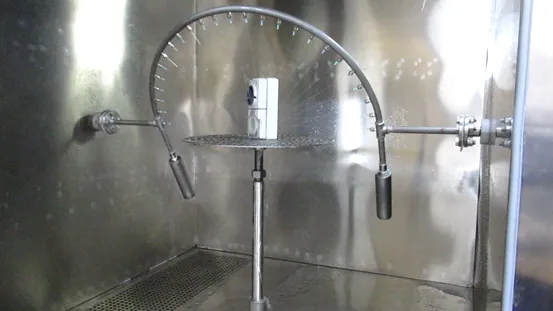IEC 60034 5 IP Testing for Rotating Electrical Machines
The International Electrotechnical Commission (IEC) Standard IEC 60034-5 is a crucial document that sets out the requirements and methods for determining the ingress protection ratings, commonly known as IP ratings. This standard specifically addresses rotating electrical machines such as motors, generators, and transformers.
The primary goal of this testing is to ensure the durability and reliability of these machines against environmental factors like dust, water, and other contaminants that may affect their performance. The ingress protection test evaluates how well a machine can withstand exposure to foreign objects and moisture, which are critical for maintaining efficiency and safety in industrial applications.
Rotating electrical machines play pivotal roles across various sectors including manufacturing, automotive, aerospace, and energy production. Ensuring compliance with IEC 60034-5 IP standards is not merely a technical requirement but also a strategic decision that enhances product quality and marketability. By adhering to these standards, manufacturers can demonstrate their commitment to safety, reliability, and performance.
The testing process involves subjecting the machine to controlled conditions designed to simulate real-world scenarios where dust or water might enter the enclosure. The standard defines a system of IP codes with two digits: the first digit indicates protection against solid objects (dust), while the second specifies protection against liquids. For instance, an IP67 rating means the device is completely protected from dust and can be submerged in water up to 1 meter deep for at least 30 minutes.
Given the critical nature of rotating electrical machines in many industries, compliance with these standards ensures that products meet stringent quality benchmarks. This not only protects end-users but also establishes a robust foundation for brand reputation and customer trust. Compliance also opens doors to global markets where IEC standards are widely recognized and accepted.
The testing process typically involves several steps: initial inspection of the machine, preparation of test samples, application of specified environmental conditions, observation and recording of results, and final analysis. The equipment used in this testing includes specialized chambers capable of simulating different levels of dust and water exposure.
Once the tests are completed, detailed reports are generated outlining all parameters tested along with their respective outcomes. These reports serve as valuable tools for quality assurance teams, helping them identify potential areas of improvement and ensuring that products consistently meet or exceed international standards.
Why It Matters
The importance of IEC 60034-5 IP Testing cannot be overstated, especially within the context of rotating electrical machines. These machines are integral components in numerous industrial processes, and their robustness against environmental elements directly impacts operational efficiency and safety.
For instance, motors used in automotive manufacturing must endure rigorous testing to ensure they can operate reliably even under harsh conditions encountered during production runs. Similarly, generators employed in renewable energy projects need stringent IP ratings to prevent malfunctions due to exposure to saltwater or sandstorms.
The reliability and longevity of these machines are paramount for maintaining smooth operations across industries. Non-compliance with IEC 60034-5 standards could lead to premature failures, increased maintenance costs, and potential safety hazards. Moreover, it might result in non-conformance issues during audits or inspections by regulatory bodies.
By adhering to these standards, manufacturers can preemptively address such risks through thorough testing protocols. This proactive approach not only enhances product quality but also fosters a culture of continuous improvement within organizations. It ensures that every component meets rigorous safety and performance criteria before reaching the market, thereby building consumer confidence.
The broader implications extend beyond individual products; they influence industry standards and practices globally. As more companies adopt these stringent testing procedures, it sets new benchmarks for excellence in electrical machinery manufacturing worldwide.
Customer Impact and Satisfaction
Ensuring compliance with IEC 60034-5 IP Testing significantly enhances customer satisfaction by delivering high-quality products that meet or exceed expectations. When customers purchase equipment from reputable manufacturers who adhere to these standards, they can rest assured knowing their investment is protected against environmental challenges.
The robustness and durability offered by compliant machines contribute positively towards long-term savings for businesses. Reduced downtime due to failures translates into increased productivity and profitability. Additionally, satisfied customers are more likely to recommend the product to others, fostering brand loyalty and expanding market reach.
From an engineering perspective, compliance with these standards encourages innovation in design and technology. Engineers strive to develop solutions that not only meet but surpass the specified requirements. This drive towards excellence leads to advancements in materials science, manufacturing techniques, and overall product performance.
The impact of such efforts extends beyond mere functionality; it influences user experience positively. For example, when choosing between two similar products, a customer might prefer one that has been rigorously tested according to recognized international standards because they know it will perform consistently under various conditions.
International Acceptance and Recognition
The global acceptance of IEC standards, including the IP ratings specified in IEC 60034-5, underscores their significance across different regions. These standards are widely recognized not only within Europe but also globally due to their comprehensive approach to product safety and performance.
Many countries have adopted these standards as part of national regulations or industry guidelines, ensuring consistent application worldwide. This international recognition fosters cooperation among manufacturers and suppliers operating in multiple markets, promoting a seamless exchange of goods and services across borders.
The harmonization brought about by IEC standards reduces barriers to trade while enhancing product quality. It facilitates easier certification processes for exporters seeking to access foreign markets without undergoing additional scrutiny from local authorities. This streamlined approach benefits both domestic producers and international customers alike.
Moreover, compliance with these internationally accepted standards enhances a company’s reputation and credibility in the eyes of potential partners and stakeholders. Organizations that demonstrate adherence to such stringent criteria are seen as leaders in their field, which can attract investments and partnerships from reputable sources.





